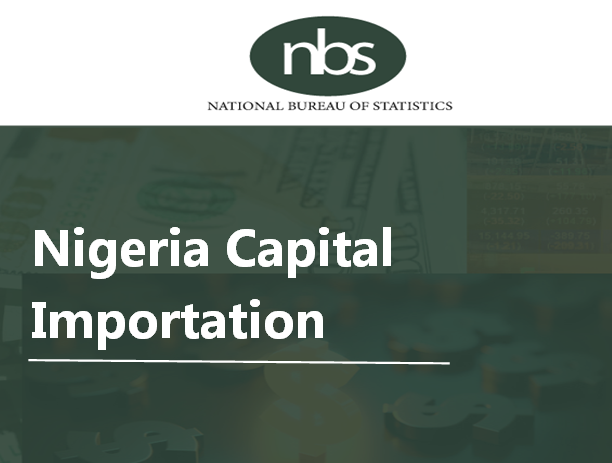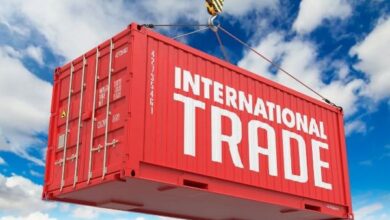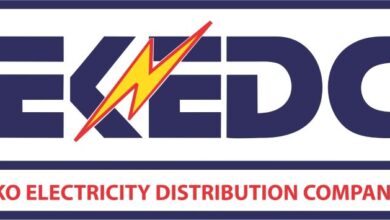
Nigeria recorded a 67.12% year-on-year increase in capital importation, with total inflows hitting $5.64 billion in Q1 2025, up from $3.38 billion in Q1 2024, according to data released by the National Bureau of Statistics (NBS).
This strong first-quarter performance—captured in the NBS “Capital Importation Report for Q1 2025”—also represents a 10.86% quarter-on-quarter rise from the $5.09 billion reported in Q4 2024, signaling a renewed investor appetite, albeit heavily concentrated in portfolio investments.
Breakdown: Where the Capital Is Coming From
Portfolio investment dominated the landscape, accounting for $5.2 billion, or a staggering 92.25% of the total inflows. This trend underscores short-term investor confidence in Nigerian financial instruments—particularly equities and debt securities—but also reinforces concerns about the relatively weak levels of Foreign Direct Investment (FDI).
- Other Investments: $311.17 million (5.52%)
- Foreign Direct Investment (FDI): $126.29 million (2.24%)
“While rising capital importation is a positive macro signal, the overwhelming reliance on portfolio flows highlights Nigeria’s vulnerability to global financial volatility,” said a Lagos-based financial analyst.
Sectoral Distribution: Banking and Financing Dominate
The banking sector attracted the highest inflow, receiving $3.13 billion—about 55.44% of total capital imported. This was followed by the financing sector at $2.1 billion (37.18%), while the production/manufacturing sector recorded a modest $129.92 million (2.3%).
This trend suggests that financial services remain the prime target for capital inflows, with real-sector investment still lagging, raising questions about the sustainability of long-term economic growth.
Top Source Countries: UK Maintains Dominance
The United Kingdom emerged as the leading source of capital importation, contributing $3.68 billion (65.26% of total inflows), reinforcing its position as Nigeria’s most influential financial partner.
Other notable contributors include:
- South Africa: $501.29 million (8.88%)
- Mauritius: $394.51 million (6.99%)
Investment Destinations: FCT and Lagos Lead the Pack
Geographically, capital inflows remain highly concentrated in Abuja and Lagos, reflecting persistent structural imbalances in regional investment distribution.
- Abuja (FCT): $3.05 billion (54.11%)
- Lagos State: $2.56 billion (45.44%)
- Ogun, Oyo, and Kaduna States collectively received less than $20 million, pointing to an urgent need to decentralize economic activity across Nigeria’s federating units.
Banking Channels: Standard Chartered, Stanbic IBTC Top the List
Three banks dominated capital inflow facilitation in Q1:
- Standard Chartered Bank Nigeria: $2.10 billion (37.3%)
- Stanbic IBTC Bank: $1.40 billion (24.78%)
- Citibank Nigeria: $1.05 billion (18.66%)
These figures reflect continued foreign investor preference for global banking institutions with Nigerian footprints, leveraging their expertise in capital markets and cross-border transactions.
BRANDECONOMY INSIGHT: Capital Inflows Are Rising, But Questions Remain
The 67% rise in capital importation provides a much-needed confidence boost for Nigeria’s economy, especially amid ongoing efforts to stabilize the naira, curb inflation, and attract external funding.
However, the imbalanced composition—with FDI accounting for just 2.24%—raises structural red flags. Portfolio flows are fickle and highly sensitive to political risk, global interest rate shifts, and currency instability.
To convert capital surges into long-term economic impact, Nigeria must:
- Deepen investor confidence through macroeconomic stability
- Streamline regulatory processes to attract genuine FDI
- Incentivize capital flow into productive sectors like manufacturing, agriculture, and tech
- Improve infrastructure and ease of doing business across states
Conclusion: A Rising Tide, But Is It Lifting All Boats?
While Q1 2025 capital importation signals renewed investor interest, the true test lies in how this capital is deployed. Without structural reforms to convert inflows into inclusive, job-creating investments, Nigeria risks repeating cycles of boom-and-bust capital movements without tangible development outcomes.











